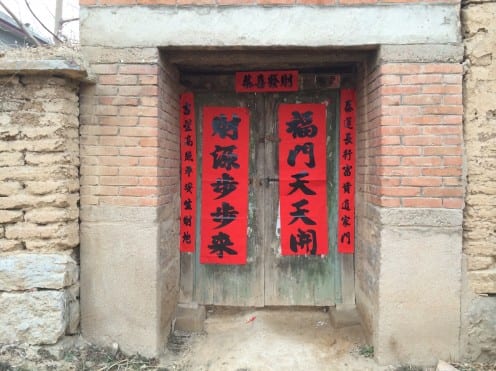Social media and mass media: the CCTV Chinese New Year’s Gala
By Tom McDonald, on 23 February 2014

Poetic couplets hung on the door of a village house in preparation for Chinese New Year (Photo: Tom McDonald)
I passed the recent Chinese New Year in my fieldsite in North China with the Wang family in their rented shopfront-cum-home on the small rural town’s commercial street, with Mr Wang, his wife and son, 16 year old Little Wang, who had just finished his term at the high school in the nearby county-town, and was back home for the school holidays.
One of the most interesting elements of the festival is social media’s relationship with the mass media event of the day (and probably the year), which is the CCTV New Year’s Gala programme produced by China Central Television. The programme is basically a variety show. But at the same time it is the most difficult variety show on the planet to get right, because its 700 million–1000 million viewers (53-76% of the country’s population) are comprised of every generation of Chinese families, who watch the show together as they eat they ‘reunion meal’. As such, the programme makers have to attempt to appeal to all these drastically different audiences. No mean feat when we are talking about elderly people who grew up in the Republican-era, witnessed the Sino-Japanese war, and the founding of the People’s Republic; or middle aged people who were children during the hardships of the cultural revolution, and then saw the enormous transformations bought by the reform-and-opening period; or China’s youth, those born in the 80’s, 90s, and 00’s, often single children, many of whom have grown up with a material aspirations on par with western society. So you end up with a variety show that is a bizarre and wizardly mix of revolutionary songs, trapeze artists, dancers performing to happy hardcore music, magicians, ‘hip’ youth TV hosts, recognised family performers and national pop stars. The show traverses the utterly naff and absolutely incredible. One cannot help but feel that the show tries so hard to appeal to everybody that it is perhaps doomed to failure.
At the Wang’s house we watched and chatted as the show went on, slowly devouring the dinner while Mr Wang and I knocked back baijiu, a fiery Chinese liquour. I soon noticed that Little Wang’s attention had waned, however, and after eating a little food, he left us and moved into the shop area of their house, where the computer is located. Soon after I followed him into the room. I noticed that he was alternating between browsing QZone, and chatting on the QQ Instant Messaging client. He was using the QQ IM client to send New Year’s ‘blessings’ (zhufu) to his classmates, while browsing his QZone. Many of the status updates from his friends were related to the television show. For example, one of the features of the show was a young girl dressed in a flowing white dress who was introduced by the presenters at the start of the programme. The presenters explained that she would spin around on the spot up until midnight (4 hours) to symbolise the changing seasons of the year. Indeed she managed to do this quite successfully. One of Little Wang’s friends had forwarded a meme of a photo of the girl asking ‘spinning girl, have you eaten Xuanmai chewing gum?’. Xuanmai chewing gum recently ran an advertising campaign with the tagline ‘Xuanmai chewing gum, unable to stop’ (xuanmai kouxiangtang, tingbu xialai). The advert featured a young man singing, with powerful sound waves coming out of his mouth, and he was challenged to see how long he could sustain the singing. After eating the chewing gum it seemed to give the man somewhat cosmic powers to continue with his crooning. What is interesting about this case is we can kind of see the spillover from a mass media event onto social media, so while people do not seem to be happy posting about news or other big events, the Spring Festival Evening Party seems to be prime fodder for discussion of QQ, but especially among young people.
There is precedent for this, as traditionally the show is something people often talk about and critique for days after, even offline. But in addition to young people talking about the New Year’s Gala online, I got a feeling during the evening that young people were having a kind of separate New Year’s Eve party on QQ with all their friends. Chinese New Year is a key moment of reunion for Chinese families, and I get a feeling that even this moment of togetherness is being affected by social media as young people are living a large part of their spring festival online with their classmates.
Does this mean that the ‘traditional’ Chinese New Year is at risk? I want to get away from the idea that social media’s presence in the spring festival necessarily has to be good or bad, or even assume that social media is ‘transforming’ the Chinese New Year (anymore than the Chinese New Year is transforming social media). It is not that Little Wang’s practices are heralding the decay of the Chinese New Year, but rather I think it is signalling the importance of classmates being part of that reunion. It seems to be an acknowledgement that family ties are not the only thing that matters, and the deliberate decision for classmates to include each other in their spring festival reunion meals suggests a willingness to apply family ideals to educational peers.
3 Responses to “Social media and mass media: the CCTV Chinese New Year’s Gala”
- 1
-
2
ChineseCurrents wrote on 24 February 2014:
Very much enjoyed reading CNY observations by @AnthroTom , an anthropologist living in northern China @UCLSocNet http://t.co/m9hMXPq8jV
- 3
 Close
Close





Latest blog post on #SocialMedia use during #Chinese New Year celebrations. http://t.co/VIwRAYC7Nl